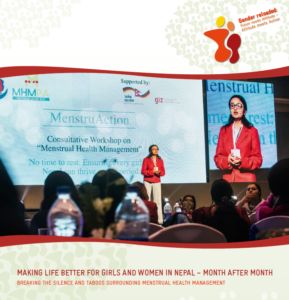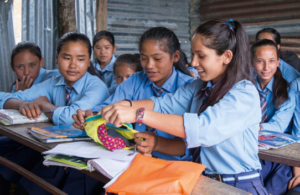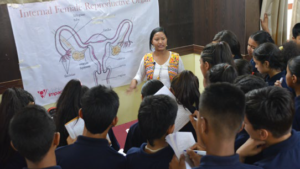BREAKING THE SILENCE AND TABOOS SURROUNDING MENSTRUAL HEALTH MANAGEMENT
CONTEXT
Many restrictions surrounding menstruation in Nepal and worldwide have arisen out of deeply entrenched cultural and religious traditions and beliefs. In Nepal, during menstruation; often girls and women are barred from visiting religious sites, entering the kitchen or even sleeping in their homes. Lack of or poor access to affordable menstrual products and sanitary facilities negatively impact a girls’ and women’s’ health and undermine their participation in education, economic and public life and thus impacting their access to equal opportunities and rights. Research commissioned by GIZ in 2016 revealed that almost 70 per cent of girls in Nepal experienced at least one form of restriction during menstruation. Thus gender equality cannot be reached in Neal until menstrual restrictions are eradicated.
GENDER – A QUALITY FEATURE OF OUR WORK
The Support to the Health Sector Programme worked with a range of organisations to establish the Menstrual Health Practitioners’ Alliance (MHMPA) in order to respond to these menstrual restrictions and gender inequality in Nepal. Over 50 organisations are in MHMPA, including government, NGOs, academia, UN agencies and INGOs. Together they implement over 80 initiatives. Since 2016, GIZ has worked with local NGOs, to develop Training of Trainers (ToT) for teachers and health service providers and youth empowerment programmes on MHM and rights. In the last two years, GIZ has conducted ToT training for some 525 individuals across three districts in Nepal. GIZ also targets male teachers and adolescent boys in their programme to empower them to reach out to their friends, fathers and communities. In 2018, with the MHMPA, GIZ organised a national consultative workshop on menstrual health management (MHM). Over 500 people attended the workshop including youth, members from the LGBTI community, government and other key stakeholders. In May 2019, GIZ Nepal published a 60-page report on the MHM movement in Nepal. Moreover, to highlight GIZ Nepal’s work on menstrual health and gender equality, six articles have been published on BMZ’s Healthy Developments. In August 2019, GIZ worked with key partners to conduct a “stakeholder mapping” of the Alliance. The MHMPA website provides insights into activities and results, factsheets and further reading.
GENDER IMPACT
The key results relate to the ways in which perspectives are changing and beliefs are adapting to the change. The Government of Nepal is developing a policy on dignified menstruation and adapting the health and science curriculum. GIZ Nepal provides technical support the government so that these policies are implemented fully. As of January 2020, the Government is distributing free compostable sanitary pads to all girls in grades 6-12 attending public schools of Nepal, thus enabling them to attend school and advance their education. GIZ continues to work with women’s collectives to assist in the local production and distribution of biodegradable sanitary pads in four municipalities, renovating school toilets and exploring new ways to produce bio-degradable pads.
Contact:
Ms. Sami Pande
GIZ/Support to the Health Sector Programme
E sami.pande@giz.de
I www.health.bmz.de (keyword “menstrual
health”) / www.myhealthrightsfuture.com
Full information Roll Up: GENDER COMPETITION 2020 Contributions SERIES I 22
Full information Roll Up: 33 EN Gender Competition GIZ S2HSP Nepal 20191129

 GIZ Gender Website
GIZ Gender Website

